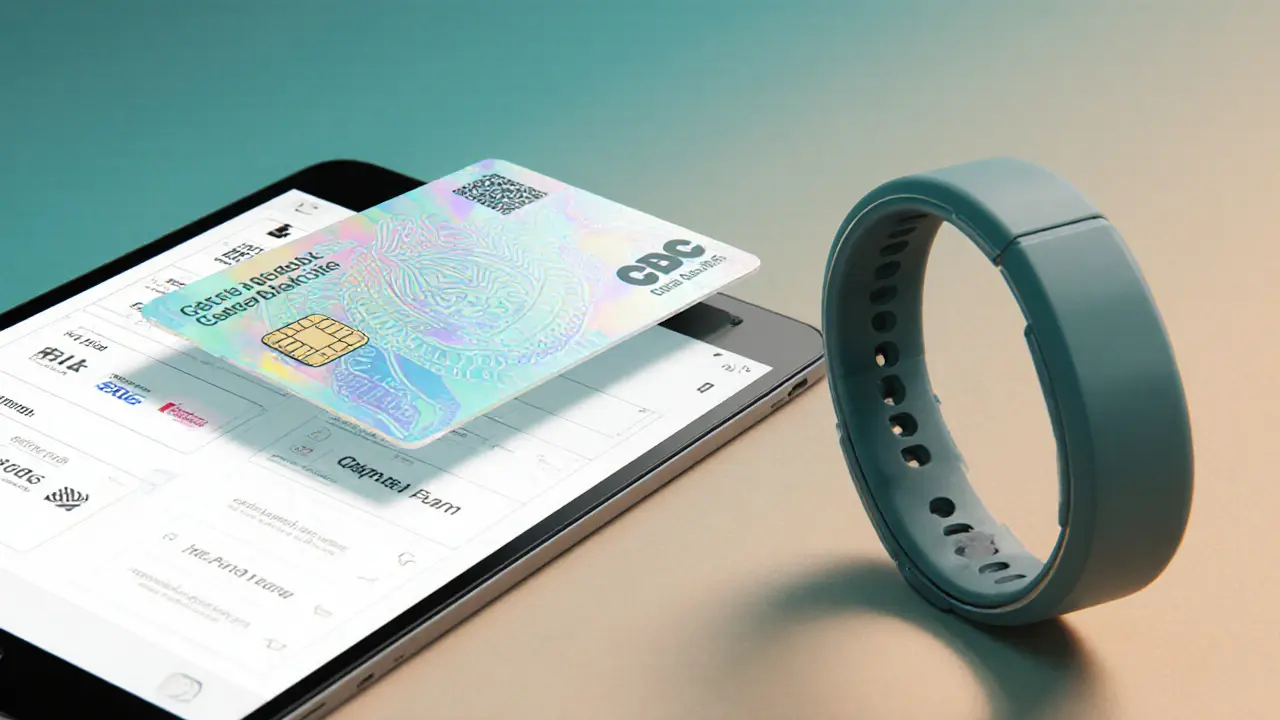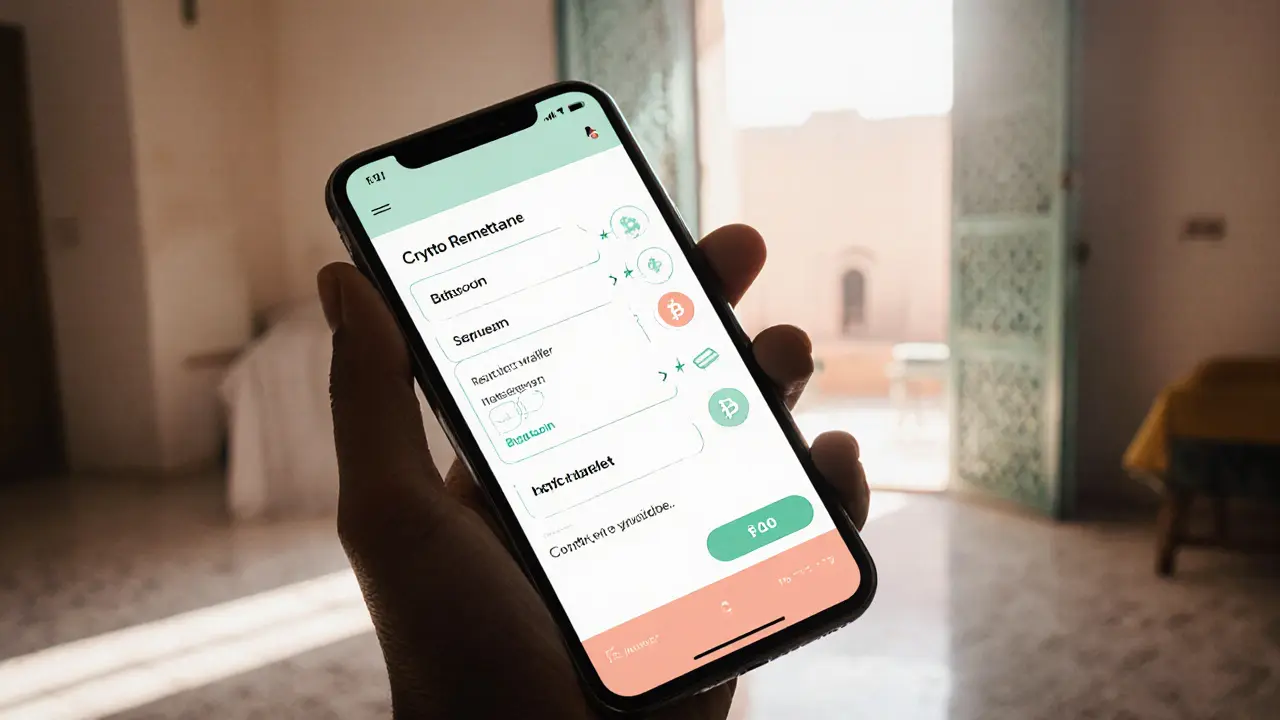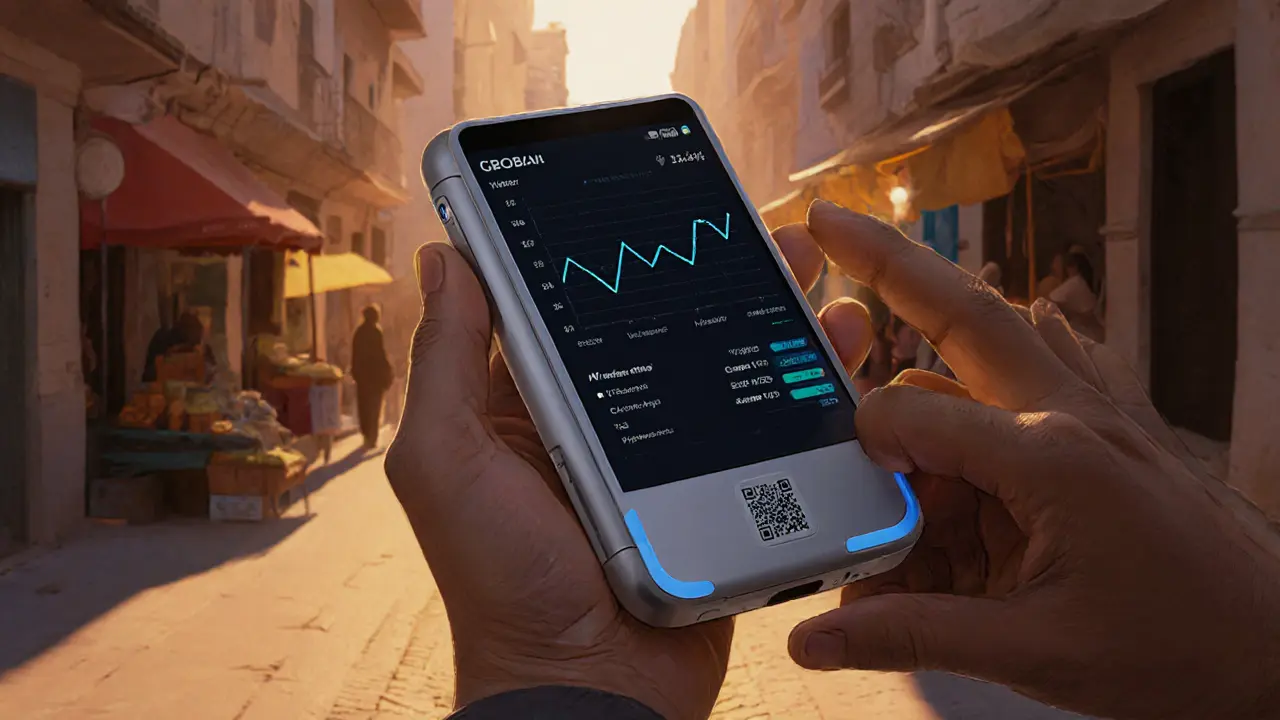Moroccan Crypto Remittance Calculator
Cost Comparison Results
Enter values and click "Calculate Cost Comparison" to see results.
| Attribute | Bitcoin | Moroccan CBDC |
|---|---|---|
| Issuer | Decentralized network of miners | Bank Al-Maghrib (central bank) |
| Volatility | High - price can swing >10% in a day | Low - pegged 1:1 to Moroccan dirham |
| Legal status | Prohibited in Morocco (underground use) | Legal once legislation passes |
| Transaction cost | ~$2-$5 per transfer (network fee) | Negligible - subsidized by central bank |
| Settlement time | 10-30 minutes (varies by congestion) | Instant (near-real-time) |
| Compliance | None - anonymous addresses | Full AML/KYC embedded |
When the traditional banking system blocks fast, cheap cross‑border transfers, Moroccans have found a work‑around in digital money. Even though Morocco has banned all cryptocurrency activity since November 2017, a bustling underground scene keeps the crypto flow alive, especially for sending money abroad. This article uncovers how everyday users, small businesses, and the diaspora sidestep the ban, what the Central Bank is doing about it, and which risks you should watch.
Quick Takeaways
- The 2017 ban pushed crypto activity underground, not extinct.
- Bitcoin and Ethereum dominate Moroccan remittance channels because they need only a phone and internet.
- Bank Al‑Maghrib is developing a Central Bank Digital Currency designed for peer‑to‑peer and cross‑border payments that could replace the illicit market.
- Regional partnerships with Egypt, the IMF and the World Bank aim to create a regulated digital‑currency corridor.
- Users face no legal protection, high volatility, and possible scams - awareness is key.
Regulatory Landscape: The Official Prohibition
The Ministry of Economy and Finance declared all crypto transactions illegal in November 2017, citing consumer‑protection gaps, money‑laundering risks, and conflicts with foreign‑exchange law. The watchdog, Bank Al‑Maghrib Morocco’s central bank that enforces monetary policy and supervises banks, has since issued several warnings and carried out occasional raids on peer‑to‑peer (P2P) networks. Yet the prohibition is a blanket ban without a licensed exchange framework, leaving a gray zone where users keep crypto alive under the radar.
Underground Crypto Networks: How the Money Moves
Even without licensed platforms, Moroccans tap into global P2P services like LocalBitcoins, Paxful, and decentralized exchanges. The typical flow looks like this:
- A sender in Casablanca buys Bitcoin the first cryptocurrency, created in 2009, with a capped supply of 21million coins using a local cash‑in method (often via an agent or informal broker).
- The buyer transfers the BTC to the recipient’s wallet address.
- The receiver in Europe or the Gulf converts the BTC to local fiat through an overseas exchange, then withdraws the money to a bank account.
Ethereum follows a similar pattern, especially for merchants who need smart‑contract functionality to lock funds until goods are delivered. Because the blockchain only requires an internet connection, users bypass Morocco’s strict foreign‑exchange controls and avoid the high fees charged by traditional remittance providers.
Why Crypto Appeals for International Payments
Three factors keep the underground market growing:
- Speed: Transactions settle in minutes, compared with days for SWIFT.
- Cost: Network fees are a fraction of the 5‑10% charged by banks and money‑transfer operators.
- Accessibility: A smartphone and a stable data plan are enough; no need for a local bank account.
These benefits matter especially for the Moroccan diaspora the estimated 5million Moroccans living abroad who regularly send remittances home. Traditional channels often impose high fees and require rigorous documentation, while crypto lets a relative in Spain send $200 to a family member in Marrakech with a few clicks.

Central Bank Digital Currency (CBDC) Initiative
Recognizing the demand, Bank Al‑Maghrib is drafting a national digital currency focused on cross‑border payments. Unlike decentralized coins, the Moroccan CBDC would be fully issued and managed by the central bank, offering fast settlement without price volatility.
The CBDC blueprint aims to:
- Provide a legal, state‑backed digital asset for peer‑to‑peer transfers.
- Integrate with existing banking infrastructure to ensure AML/KYC compliance.
- Enable instant, low‑cost cross‑border settlements through regional blockchain pilots.
Governors Abdellatif Jouahri and his team are working with the IMF and the World Bank to test interoperability with Egypt’s own digital‑currency experiments, hoping to create a North‑African payments corridor.
Bitcoin vs. Moroccan CBDC: Feature Comparison
| Attribute | Bitcoin | Moroccan CBDC |
|---|---|---|
| Issuer | Decentralized network of miners | Bank Al‑Maghrib (central bank) |
| Volatility | High - price can swing >10% in a day | Low - pegged 1:1 to Moroccan dirham |
| Legal status | Prohibited in Morocco (underground use) | Legal once legislation passes |
| Transaction cost | ~$2‑$5 per transfer (network fee) | Negligible - subsidized by central bank |
| Settlement time | 10‑30minutes (varies by congestion) | Instant (near‑real‑time) |
| Compliance | None - anonymous addresses | Full AML/KYC embedded |
Regional Cooperation and the 2025 Draft Law
On July212025, Bank Al‑Maghrib announced a draft law aiming to legalize regulated crypto activities, especially for remittances and trade finance. The proposal separates “unauthorized trading” from “licensed digital‑asset services.” If adopted, licensed exchanges could offer wallets, conversion, and compliance tools, effectively moving the underground market into a formal sector.
Simultaneously, the central bank’s partnership with the World Bank global development institution that funds financial‑inclusion projects and the IMF focuses on cross‑border CBDC pilots. These pilots test settlement between Moroccan and Egyptian digital currencies, using a private‑consortium blockchain to reduce transaction fees for traders crossing the Mediterranean trade corridor.
Risks and Consumer‑Protection Gaps
While crypto offers speed and cheapness, the ban leaves users exposed:
- No legal recourse: If a P2P broker disappears, the victim can’t file a claim.
- Volatility shock: A sudden BTC dip can erase a sender’s remittance value before conversion.
- Scams and phishing: Fake wallet apps targeting Arabic‑speaking users proliferate.
- Regulatory crackdown: Periodic enforcement sweeps can lead to asset freezes or fines.
Experts advise diversifying across stablecoins (e.g., USDC) and keeping transaction records for potential future compliance.
Practical Guide: Sending a Crypto Remittance From Morocco
- Choose a reputable P2P platform (e.g., LocalBitcoins) that accepts cash‑in via a local agent.
- Create a cryptocurrency wallet software that stores private keys and enables sending/receiving crypto on your phone. Recommended apps: Trust Wallet, Metamask.
- Verify the recipient’s wallet address (double‑check the string).
- Enter the amount in Moroccan dirhams, let the platform calculate the crypto equivalent, and confirm the trade.
- Pay the agent the cash amount plus any agreed‑upon spread.
- The platform releases the crypto to the recipient’s address; the receiver then swaps it for local fiat on an overseas exchange.
- Record the transaction ID and keep screenshots in case of disputes.
For larger sums, many users opt for stablecoins like USDC to lock in value during the transfer, then convert to fiat after the recipient receives the coins.

Frequently Asked Questions
Is using Bitcoin illegal in Morocco?
Yes. The 2017 decree labels all cryptocurrency transactions illegal, but enforcement focuses on organized exchanges. Individual P2P trades remain technically prohibited but are widely practiced.
What is the difference between a CBDC and Bitcoin?
A CBDC is issued by a central bank, pegged to the national currency, and fully regulated. Bitcoin is decentralized, volatile, and operates without any government backing.
Can I convert crypto to Moroccan dirhams without a bank?
Typically you’ll need an overseas exchange or a trusted local agent who can sell the crypto for cash. Direct crypto‑to‑MAD swaps are not offered by licensed Moroccan banks.
Will the 2025 draft law legalize my crypto remittance?
The draft aims to create a licensed framework for crypto services, but it still distinguishes between regulated exchanges and unlicensed P2P activity. Full legality will depend on how the law is enacted and the licensing process.
What are the safest crypto options for sending money abroad?
Stablecoins (USDC, USDT) reduce price volatility, while using reputable wallets and two‑factor authentication protects against theft. Always verify the counter‑party’s reputation on the P2P platform.

